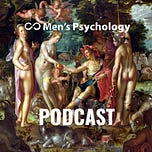Welcome to a series of videos that will introduce you to a simple model of men’s psychology that draws on some of the growing body of research on men.
There’s more than meets the eye with men, just as there is with women. Men are driven at the core by instincts the same as women—masculine instincts.
However, just like women, they have emotions of very similar types and style. The expression is different because emoting is in some part, governed by the instincts.
Finally, the intellect and mature executive functions are also just like those of women (we have identical IQ potential - and “EQ” potential.) Yet the masculine instincts also influence that, and our communication and behavior.
This synthesis of the old and new, the rigorous and the elegant, and most important of all, an attempt at “unification of the psychologies” is the aim of Masculine Psychology, as we start to discuss in this first video.
It’s Masculine Psychology (originally, MMP), which is available in videos delivered one day at a time, for the full 5+ hours of the course (available to paid subscribers only)…
Upgraded Members get full access to the full program and many others from Men’s Psychology right away without waiting for lesson-by-lesson:
SUMMARY:
In this discussion, Dr Paul reflects on themes of fatherhood, personal growth, and the complexities of male identity in relation to the narrative of a character who undergoes an initiation process. Key points include:
1. **Oedipal Struggle**: The narrative highlights an Oedipal struggle where the protagonist accidentally kills his real father, which symbolizes a common theme where a son must figuratively "kill" his father to ascend to the patriarchal role within the family.
2. **Symbols of Initiation**: The idea of initiation is explored through the character's changing perceptions of his father, which evolves as he matures. Initially filled with resentment, he learns to see his father in a more nuanced light, ultimately forgiving past faults while still retaining valuable lessons from his father’s legacy.
3. **Grieving and Growth**: The speaker emphasizes the importance of grieving one’s father, suggesting that individuals can "harvest" the good qualities while forgiving the bad, allowing for personal growth and a healthier perspective.
4. **$4 Million Symbolism**: The mention of the "$4 million" relates to a shift in the protagonist's mindset from a scarcity mentality to realizing his inherent worth and potential. This newfound wealth symbolizes recognizing one’s resources and capabilities, both emotionally and psychologically.
5. **Mature vs. Immature Thinking**: The speaker compares immature thinking characterized by scarcity and defeatism with mature, abundance-oriented thinking. The protagonist's journey reflects a transition from a victim mentality to an empowered approach to life, indicating that individuals have "genetic currency" and substantial potential within them.
6. **Confronting Anxiety**: The discussion hints at the protagonist’s evolution in dealing with life's challenges, emphasizing the importance of tapping into one's inner resources to handle anxiety and adversity instead of being overwhelmed by fear.
Overall, the conversation delves into the emotional depth of father-son relationships, the process of maturity, and the significance of self-discovery and empowerment in personal identity formation.













Share this post